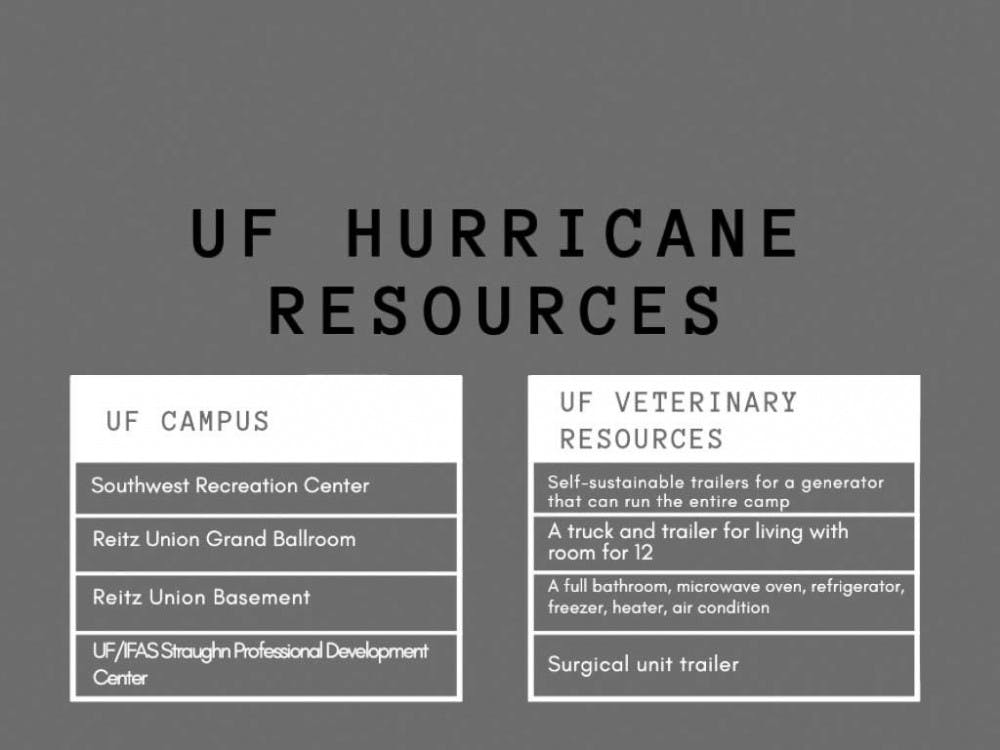In recent years, UF students felt the danger of hurricane season firsthand from the devastating storms of Hurricane Irma and Hurricane Maria.
This year’s hurricane season, which starts in June and ends in November, is still filled with uncertainty, said Corene Matyas, UF associate professor in the geology department.
Predictions are made by examining general levels of activity, like whether the number of storms that form might be average, below average or above average, she said. These predictions are based on regional scale characteristics like the ocean temperature and potential winds.
The past few hurricane seasons were memorable because they went over land and impacted a lot of people, she said.
To ensure UF is ready this season, UF’s Department of Emergency Management has been preparing by offering shelter managers training courses for UF employees interested in serving if a disaster arises, said Kenneth Allen, director of the department.
“As we ramp up the hurricane season, the hurricane shelters on campus have all completed a walkthrough — making sure they are ready to serve as shelters this year,” he said.
The university opens shelters based on situations and demand. The available shelters include Southwest Recreation Center, the Reitz Union’s grand ballroom and basement, IFAS Extension Straughn Professional Development Center and the Steinbrenner Band Hall.
Buildings qualify as shelters under a specific Florida building code known as Enhanced Hurricane Protection Area (EHPA), he said. Shelter buildings have higher windborne protection and are also examined for the number of bathrooms, air circulation and amount of open space.
“All of us,m as a part of living in Florida and being a member of the university community, should be thinking about hurricanes and be prepared for them,” he said.
The department stresses students to get a plan, get a kit and be informed, he said. “Getting a kit” means having at least three days worth of food, water and basic supplies, like a first aid kit, battery-powered radio and flashlight.
Florida is holding a sales tax holiday on emergency items this week until Thursday, he said.
Even though the department stresses personal preparedness, the university works to monitor potential tropical weather throughout hurricane season, he said.
Allen suggests staying informed by not only following official university accounts, like UF Public Safety, but also paying attention to local media to gauge potential impact in the area.
If the threat increases locally, the university responds in a manner it deems appropriate, Allen said. This could include canceling classes or closing university offices.
The university isn’t just preparing for student safety but also animal safety. The Veterinary Emergency Treatment Services at UF’s College of Veterinary Medicine is preparing for potential emergency relief operations as hurricane season begins, said Dr. Lawrence Garcia, medical director for veterinary emergency treatment services.
The department, made up of first responders who help in animal-related concerns post-disaster, makes its services available to the state’s Agricultural Response Team, Garcia said.
The team prepares by holding briefings, getting equipment serviced and up to date, keeping generators running and more. Petsmart charities and Banfield have also just donated a truck and trailer to the department worth about $150,000.
In emergencies, like Hurricane Irma, the department can set up a field hospital, which is helpful with the new trailer and truck.
They also have a surgical unit trailer, used for minor surgical procedures such as laceration repairs on cats and dogs.
“To be able to be that resource for someone who has just experienced unbelievable devastation is life changing,” Garcia said.
Shelters on campus open based on the circumstance and are usually not all opened at the same time.






